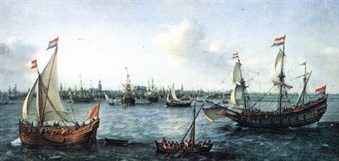The Netherlands
 The set of territories known as the Netherlands belonged, in the fifteenth century, to the Duchy of Burgundy. It was in the Burgundian court, open to humanistic influences, that the first code of courtly etiquette was born, which, in a short time, spread to the major European courts. At the death of the last duke, Charles the Bold (1433-1477), the Netherlands became part of the Habsburg domains, because of the marriage between Maria, the daughter of Charles, and Archduke Maximilian I. The varied territorial structure, consisting of provinces of different languages, political and economic systems, enjoyed a period of wealth and expansion during the sixteenth century. Philip the Fair (1478-1506) and Charles V (1500-1558) sought to secure the support of local leaders and put them firmly under the domain of the Habsburgs. After his departure (1517), Charles left his Aunt Margaret and then her sister Mary as governors. His son, Philip II (1527-1598) did not treat the Netherlands with the same respect of his father, also being perceived by his subjects as a foreign sovereign. An economic downturn, the discontent of the local aristocracy at being excluded from positions of power and the religious problem arising from the presence of a growing Huguenot community were at the origin of the outbreak of the revolt of the Netherlands and of a war that would last eighty years (1568-1648), through which the Habsburgs were not able to regain control of the territory. After the Truce period of twelve years (1609-1621), the war resumed within the more general conflict known as the Thirty Years’ War (1618-1648). By the Peace of Westphalia (1648), the Seven United Provinces gained independence from the Habsburg monarchy, thereby separating themselves from the other southern provinces. Becoming a leading colonial and commercial power, the United Provinces clashed repeatedly with England in the second half of the seventeenth century until the Stadtholder William III of Orange was called to the throne of England in 1688.
The set of territories known as the Netherlands belonged, in the fifteenth century, to the Duchy of Burgundy. It was in the Burgundian court, open to humanistic influences, that the first code of courtly etiquette was born, which, in a short time, spread to the major European courts. At the death of the last duke, Charles the Bold (1433-1477), the Netherlands became part of the Habsburg domains, because of the marriage between Maria, the daughter of Charles, and Archduke Maximilian I. The varied territorial structure, consisting of provinces of different languages, political and economic systems, enjoyed a period of wealth and expansion during the sixteenth century. Philip the Fair (1478-1506) and Charles V (1500-1558) sought to secure the support of local leaders and put them firmly under the domain of the Habsburgs. After his departure (1517), Charles left his Aunt Margaret and then her sister Mary as governors. His son, Philip II (1527-1598) did not treat the Netherlands with the same respect of his father, also being perceived by his subjects as a foreign sovereign. An economic downturn, the discontent of the local aristocracy at being excluded from positions of power and the religious problem arising from the presence of a growing Huguenot community were at the origin of the outbreak of the revolt of the Netherlands and of a war that would last eighty years (1568-1648), through which the Habsburgs were not able to regain control of the territory. After the Truce period of twelve years (1609-1621), the war resumed within the more general conflict known as the Thirty Years’ War (1618-1648). By the Peace of Westphalia (1648), the Seven United Provinces gained independence from the Habsburg monarchy, thereby separating themselves from the other southern provinces. Becoming a leading colonial and commercial power, the United Provinces clashed repeatedly with England in the second half of the seventeenth century until the Stadtholder William III of Orange was called to the throne of England in 1688.
Read more :
- S. Schama, The Embarrassment of Riches. An Interpretation of Dutch Culture in the Golden Age, Los Angeles 1988.
- J.I. Israel, The Dutch Republic. Its Rise, Greatness and Fall, 1477-1806, Oxford 1998.
